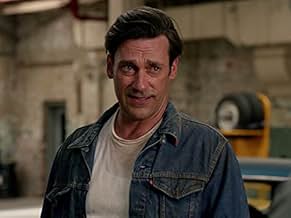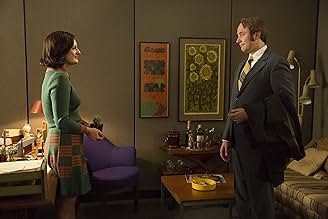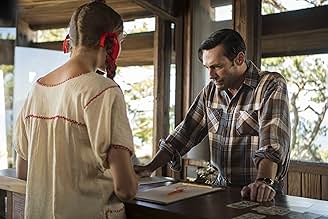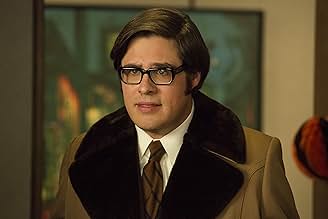Ein Drama über eine der renommiertesten New Yorker Werbeagenturen zu Beginn der 1960er Jahre, mit Schwerpunkt auf dem mysteriösen, aber extrem talentierten Anzeigenmanager der Firma, Donald ... Alles lesenEin Drama über eine der renommiertesten New Yorker Werbeagenturen zu Beginn der 1960er Jahre, mit Schwerpunkt auf dem mysteriösen, aber extrem talentierten Anzeigenmanager der Firma, Donald Draper.Ein Drama über eine der renommiertesten New Yorker Werbeagenturen zu Beginn der 1960er Jahre, mit Schwerpunkt auf dem mysteriösen, aber extrem talentierten Anzeigenmanager der Firma, Donald Draper.
- 16 Primetime Emmys gewonnen
- 166 Gewinne & 450 Nominierungen insgesamt
Folgen durchsuchen
Zusammenfassung
Reviewers say 'Mad Men' is lauded for its deep character studies, historical accuracy, and nuanced depiction of the 1960s, focusing on the advertising industry. The show delves into themes of identity, power, and societal change, with standout performances, especially Jon Hamm as Don Draper. Its meticulous period detail receives high praise. However, some viewers critique the slow pacing, repetitive storylines, and occasional frustration with character exits and unresolved plotlines.
Empfohlene Bewertungen
This is a perfect show in every sense. The opening credits & animated intro are themselves works of art, and the creative direction makes the series so visually exquisite that you can't take your eyes off the screen even for a moment lest you miss one of the many perfect vignettes. The haunting opening music sets the stage for masterful sound design, ranging from each episode's musical selections to the subtlest of ambient sounds. The camera-work is nothing short of stunning; it loves each character and makes even the background action interesting. Talented cast and every character is watchable & believable.
For a period piece, 'Mad Men' is remarkably fresh. The show is set in 1960, following a decade of post-WWII recovery which, with the help of rampant consumerism, transformed America from an industrial society into a "leisure society". One of the most rewarding things about the show is how we get to witness the many cracks which had already begun to form in the manicured facade of the '50s, slowly making way for America's rebellion against the manufactured "good life", and resulting in the social & political upheaval of the 1960s and 1970s.
We get to have intimate glimpses into the various components of this process--money, power, politics, sex, race, gender roles-- in a way that makes us feel as if we're actually there in the room with the characters. The show also does a magnificent job of portraying the simultaneous liberation and objectification of women as consumerism rapidly transformed their role in society.
Each and every well-developed character on this show takes his/her turn to unfold in delicate layers. This unfolding is done with pin-point precision and subtlety, and without ever spoon-feeding us. And every new nugget of information is a highly relevant piece of this very addictive puzzle.
~NN
For a period piece, 'Mad Men' is remarkably fresh. The show is set in 1960, following a decade of post-WWII recovery which, with the help of rampant consumerism, transformed America from an industrial society into a "leisure society". One of the most rewarding things about the show is how we get to witness the many cracks which had already begun to form in the manicured facade of the '50s, slowly making way for America's rebellion against the manufactured "good life", and resulting in the social & political upheaval of the 1960s and 1970s.
We get to have intimate glimpses into the various components of this process--money, power, politics, sex, race, gender roles-- in a way that makes us feel as if we're actually there in the room with the characters. The show also does a magnificent job of portraying the simultaneous liberation and objectification of women as consumerism rapidly transformed their role in society.
Each and every well-developed character on this show takes his/her turn to unfold in delicate layers. This unfolding is done with pin-point precision and subtlety, and without ever spoon-feeding us. And every new nugget of information is a highly relevant piece of this very addictive puzzle.
~NN
The journey is a most interesting one in Don Draper's universe that occupies a time (1960s) in American culture when changes occurred in warp speed. No Pollyanna view of the world, 'Mad Men' explores the full spectrum of human relationships, personality types, and emotions.
The show's creator Matthew Weiner (previously executive producer/writer of 'The Sopranos') takes viewers on a high-ball roller coaster of human experiences that explore pursuit of bliss, the depths of where one can go, and the winding roads of inner angst one must often travel.
'Mad Men' is the ultimate ensemble drama series with grown-up adult themes that drill deep into the human psyche and often self-destructive behavior patterns of the 1960s post-WWII Greatest Generation that populated the high-flying, high-pressure Madison Avenue ad agencies.
Those ad agencies created the culturally iconic images cast through television, radio and print media during that turbulent, mass-consumption decade in American society, when Baby Boomers started taking over the reigns of influence in America, much of it in conflict with Greatest Gen thinking.
There is nothing low key about 'Mad Men'. Tension and conflict is layered throughout the series. Weiner covers a lot of territory of the human experience that exists inside complex personalities and their relationships, and the intense emotions that often accompany them.
As it stands now, 'Mad Men' is the best TV drama series of all-time; I don't believe there is even a close second.
The show received 4 consecutive "Outstanding Drama Series" Emmys (21 total Emmy wins out of 116 nominations) to close out it's relatively brief pre-determined tenure of 7 seasons.
Those who have seen every episode in sequence, experience a level of high-quality TV viewing that sets the bar to the pinnacle, and rivals the best theatrical movies in production, casting, acting, and story-telling.
Matthew Weiner's unique concept alone puts it into a must-try category.
For those who have seen the entire series, it is even better the second, third time around (and one gains value in more rapid linear viewing, rather than having to wait months to see the next season, or a week to watch the next episode).
Marathon binge-viewing of consecutive episodes can be exhausting, but the series' irresistible gravitational force inevitably draws you back into the center of Draper's universe to watch the next episode - You just can't look away.
View 'Mad Men' from episode one, season one. The trip is well worth the time.
👍👍
The show's creator Matthew Weiner (previously executive producer/writer of 'The Sopranos') takes viewers on a high-ball roller coaster of human experiences that explore pursuit of bliss, the depths of where one can go, and the winding roads of inner angst one must often travel.
'Mad Men' is the ultimate ensemble drama series with grown-up adult themes that drill deep into the human psyche and often self-destructive behavior patterns of the 1960s post-WWII Greatest Generation that populated the high-flying, high-pressure Madison Avenue ad agencies.
Those ad agencies created the culturally iconic images cast through television, radio and print media during that turbulent, mass-consumption decade in American society, when Baby Boomers started taking over the reigns of influence in America, much of it in conflict with Greatest Gen thinking.
There is nothing low key about 'Mad Men'. Tension and conflict is layered throughout the series. Weiner covers a lot of territory of the human experience that exists inside complex personalities and their relationships, and the intense emotions that often accompany them.
As it stands now, 'Mad Men' is the best TV drama series of all-time; I don't believe there is even a close second.
The show received 4 consecutive "Outstanding Drama Series" Emmys (21 total Emmy wins out of 116 nominations) to close out it's relatively brief pre-determined tenure of 7 seasons.
Those who have seen every episode in sequence, experience a level of high-quality TV viewing that sets the bar to the pinnacle, and rivals the best theatrical movies in production, casting, acting, and story-telling.
Matthew Weiner's unique concept alone puts it into a must-try category.
For those who have seen the entire series, it is even better the second, third time around (and one gains value in more rapid linear viewing, rather than having to wait months to see the next season, or a week to watch the next episode).
Marathon binge-viewing of consecutive episodes can be exhausting, but the series' irresistible gravitational force inevitably draws you back into the center of Draper's universe to watch the next episode - You just can't look away.
View 'Mad Men' from episode one, season one. The trip is well worth the time.
👍👍
Mad Men was such a terrific show that is absolutely just as good as everyone says it is. I never watched it when it was originally on but after hearing so many great things about it I finally gave it a chance and streamed it. I was blown away but how much I loved it. There's a reason it won so many awards when it was on...because it's terrific! The acting, writing, directing, production, attention to detail, etc are all among the best in television history! I can see why some people may not like it because it does starts off a little slow but give it a few episodes because it absolutely pays off and then you won't want to stop watching it until you binge the entire series!
The central character in this show is a deeply damaged man called Don. He has a strong survival instinct, but he's incapable of loving or even trusting. He is running scared. He compensates for his insecurity and emptiness by pursuing primal things that soothing his ego. He has to feel that he's in control, even though he's living on the edge. He tries to be the "Alpha Male" conquering all around him. In reality, he is a juggler about to drop all the balls.
The others in this show are complex human beings whose characters dictate how their lives evolve and ultimately end up.
One interesting character that you follow throughout the series is Peggy. She enters the world of advertising as a total innocent, but as the show progresses, you'll see her become a worldly and powerful business woman.
The show is full of examples of the attitudes and mindset of the 1960s. The type writer was designed "so even a woman can learn how to use it". Everybody smokes, a lot. It's ok for kids to play with plastic bags over their heads. Women are treated in a way that would surely be considered sexual harassment in today's world. These unacceptable things jump out at you and startle you, and give you a flavor of that era.
The show was a hit for a reason. It's very good!
The others in this show are complex human beings whose characters dictate how their lives evolve and ultimately end up.
One interesting character that you follow throughout the series is Peggy. She enters the world of advertising as a total innocent, but as the show progresses, you'll see her become a worldly and powerful business woman.
The show is full of examples of the attitudes and mindset of the 1960s. The type writer was designed "so even a woman can learn how to use it". Everybody smokes, a lot. It's ok for kids to play with plastic bags over their heads. Women are treated in a way that would surely be considered sexual harassment in today's world. These unacceptable things jump out at you and startle you, and give you a flavor of that era.
The show was a hit for a reason. It's very good!
Mad Men is one of the best-written and most ambitious TV shows in some time. It is worth close study, not just for learning how to create a well-structured show but also how to write one that is truly original and potentially groundbreaking. Story world, or arena, is one of the key structural elements in any TV drama (see the TV Drama Class for how to create this element, as well as the other essential structural elements of a successful show). It is where the story takes place and it usually exists within some specific arena that not only delineates a recognizable unit but also has a set of rules, activities and values that defines the characters. One of the strengths of Mad Men is its story world. Instead of the usual arena of cops, lawyers, or doctors, Mad Men takes us into a Manhattan advertising agency in 1960. Besides being totally unique in TV, this story world is extremely detailed. And the detailing isn't simply a matter of the set design, which is fabulous. It is written into every episode. The writers weave all manner of cultural icons of the late 50s-early 60s, including TV shows, ads, and fashion. This has two great advantages. One is the pleasure of recognition. If you were a kid at that time, as I was, the show is a virtual time machine. And even if you weren't, the authenticity and texture immerse you in the world and make you feel that "You are there!" The other great advantage is that this past world tricks the audience into believing that this is how it really was back then. The first thing we notice when we see all of these details is how much the world has changed. Everybody smoked back then. The men were in charge and the women were all secretaries and housewives. That sets up the kicker. By first thinking how much we've changed, we then realize, with even more impact, all the ways we haven't. This story, set in 1960, is really about today, or more exactly, the ways that human nature only puts on a new skin and the same fundamental challenges of creating a meaningful life must be faced by each of us, every moment of every day. Another structural element that immediately jumps out at you if you want to create a TV show or write for one is the desire line. In Mad Men the desire that structures each episode is fairly nebulous, and that's probably going to cut into the show's popularity (I hope I'm wrong on this one). Desire is the main reason almost all TV shows are set in the cop, lawyer, and doctor arenas. These jobs give their shows a simple and repeatable desire line that tracks the episode every week. Catch the criminal. Win the case. Save the life. But of course this is extremely limiting. Most people don't spend their daily lives solving crimes, prosecuting bad guys, and saving lives. So while the desire line on this show may be more nebulous, it is far closer to what most Americans do in their daily lives. These Mad Men are in the business of selling, which, as Arthur Miller pointed out long ago, is the archetypal American action. But they aren't selling a particular product. They're selling desire, some image of the good life that, because it is a fabricated ideal, is always just out of reach. Writer Matthew Weiner's brilliant conception for this show is to connect the selling of desire to America to the personal and work lives of the ad men themselves. The ad men want the image of the good life in America that they are selling to be true, even if they intellectually make fun of the poor suckers out there who buy it. Main character Don Draper is handsome and talented, with a beautiful wife and two cute little kids. But he has some secrets he's keeping like a mistress in the city and he feels a terrible void he has no idea how to shake. Draper is a master at manipulating desire and creating facades, so when he tries to live the promise for real, the "good life" falls apart in his hands. We are in Far from Heaven and American Beauty territory here. And the second episode even had Draper give his own version of the Existentialist credo of Sartre and Camus that was seeping into pop culture during the late 50s (how's that for a sweet detail on a TV show?). We'll have to see whether Mad Men can extend beyond a few episodes without imploding. Besides the lack of a clean desire line, the subject of hollow suburban existence will make it extremely difficult for the writers to develop the show over the long term without beating a spiritually dead horse. In the meantime, I'm going to sit back and enjoy some great dramatic writing, and nowadays TV is the only place you'll find it.
Wusstest du schon
- WissenswertesAccording to Jon Hamm, the production's pursuit of historical accuracy is such that series researchers will insist on knowing weather conditions, news items, and popular culture for a particular period related to the script's time frame.
- PatzerEpisodes from Season 1 to Season 3 feature rotary phones with clear plastic finger wheels. These episodes take place before 1964, when the plastic wheel was introduced. Before that, the finger wheels were black and metal.
- Zitate
[repeated line]
Don Draper: What do you want me to say?
- VerbindungenEdited into Yoostar 2: In the Movies (2011)
Top-Auswahl
Melde dich zum Bewerten an und greife auf die Watchlist für personalisierte Empfehlungen zu.
- How many seasons does Mad Men have?Powered by Alexa
- How come no one can tell that Sal is gay?
- Do they really smoke all those cigarettes?
- In what month and year is Mad Men set?
Details
- Erscheinungsdatum
- Herkunftsland
- Offizielle Standorte
- Sprache
- Auch bekannt als
- Gã Điên
- Drehorte
- Produktionsfirmen
- Weitere beteiligte Unternehmen bei IMDbPro anzeigen
Zu dieser Seite beitragen
Bearbeitung vorschlagen oder fehlenden Inhalt hinzufügen











































